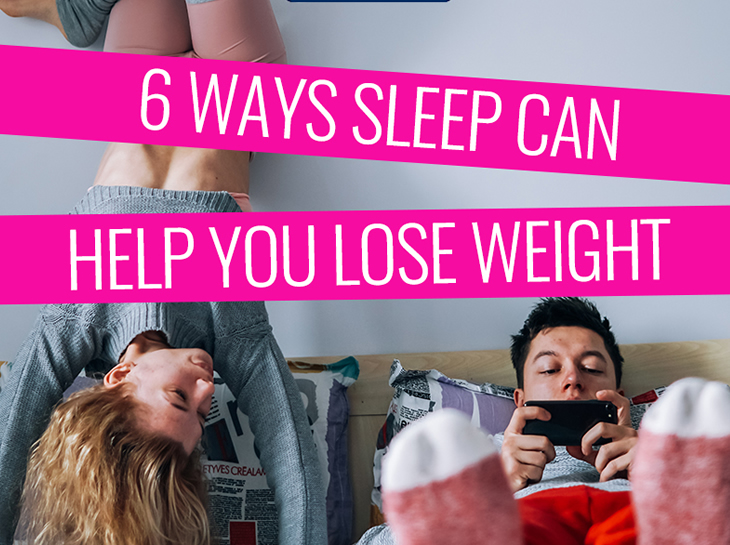
6 Ways Sleep Can Help You Lose Weight

When we were young, our
mothers always told us how much we needed to get a good night's
sleep.
After all, restful sleep is important to good health. Perhaps it is more important than many of us realise. Numerous studies through the years have shown that how much sleep we get can directly affect how much we weigh. Sleeping too little or too much can lead to weight gain while sleeping just enough can help us lose those extra pounds and keep them off. For the record, the Mayo Clinic's Dr Donald Hensrud says the optimal amount of sleep is 5 to 9 hours per night. Anything less than five is too little; anything more than nine is too much. With that in mind, here are six ways that sleep affects both weight loss and gain:

Sleep Affects
Food Choices
When you do not get enough sleep, your brain is tired. And when that happens, you are more likely to make bad food choices. Studies have shown that people who are sleep-deprived are more likely to choose foods that are high in carbs and fat. Individuals who don't sleep enough also tend to consume more sugar. Just think about that sweet latte you indulge in every morning in order to wake up.
Sleep Affects Hunger Levels
Lack of sleep is known to interrupt hormonal balance. Where hunger is concerned, not getting enough sleep tends to make you hungry more often due to an imbalance of two hormones known as leptin and ghrelin. The former tells you to stop eating because you are full while the latter signals your body that it's time to eat. When both are out of balance, you are likely to eat more than you need.


Fatigue Causes the Body to Store Fat
Another hormone, cortisol, spikes when you're not getting enough sleep. Cortisol triggers your body to conserve as much energy as possible so that your body is properly fuelled, resulting in a natural tendency to store fat. In other words, not sleeping enough is actually triggering your body to store more of what you eat rather than burning it as energy.
Sleep Affects Insulin Levels
When you're getting enough restful sleep, your body is able to process the insulin it needs to break down sugars and starches into usable energy sources. On the other hand, not having enough insulin results in an inability to process the foods you consume, leading to even more fat storage.


sleep Affects Exercise
Studies have shown a direct correlation between how much sleep people get and how often they exercise. Those who sleep too little often find they do not have enough time to exercise regularly while those who sleep too much tend to lack the will to exercise. Both groups also tend to say they just don't have the energy to exercise. At any rate, not getting enough exercise directly affects weight gain and loss.
Too Much Sleep Can Lead to Lethargy
While it's true that not getting enough sleep is unhealthy, getting too much sleep can be equally so. People who tend to sleep more than nine hours per night are more likely to be lethargic throughout the day. Lethargy results in a lack of drive and energy, which then dictates that a person will burn fewer calories throughout the day due to lack of activity. On the other hand, feeling refreshed and ready to go in the morning tends to be a great motivating factor to keep moving. The more you move, the more calories you burn in your daily routine.

Get Enough Quality Sleep
to Help Weight Loss
The relationship between sleep and weight gain/loss is fascinating in the sense that sleep, by itself, doesn't determine how difficult a time a person has managing weight. But sleep does affect decision-making, hormonal balance, metabolism, and the amount of energy we put into the day's activities. Those four factors are direct influences of both weight gain and loss.
If you get between five and nine hours of restful sleep every night, you should have an easier time maintaining a healthy weight. By combining restful sleep and good decisions about diet and exercise, you will be better equipped to lose weight if you need to. On the other hand, sleeping too little or too much will make maintaining your weight more difficult. Sleep is the place to start in your goal to reach and maintain your desired weight.
Tips For sleeping Well
If you want to lose weight, or simply want to avoid gaining weight, then sleeping well can play an important part. Here are some tips for making sure you get enough good quality sleep:
Stick to a schedule

This means going to bed and getting up at the same time each day. When your body is in a routine you will find it easier to fall asleep at night and to wake up in the morning.
electronic devices

Try to avoid using your phone, tablet, laptop and TV for at least 1-2 hours before bed. These devices can emit light towards the blue end of the spectrum which makes your brain think it's time to be awake.
Control Light

Our natural rhythm which governs when we feel tired and when we feel awake is impacted by light. Get plenty of daylight to feel alert during the day, but make sure your bedroom is dark at night to help switch off.
Sleep comfortably

If your bed is uncomfortable then it isn't surprising that you may find it difficult to drift off, leaving you tossing and turning throughout the night. Invest in a good quality mattress, such as a Dormeo memory foam mattress, to help you get a great night's sleep every night.
What you consume

Try to avoid consuming any stimulants for a few hours before bed, including caffeine, nicotine and alcohol. Large meals may also make getting to sleep more difficult; try smaller snacks of nuts or warm milk.
Relax

Try to avoid getting your adrenaline pumping by doing any high intensity exercise and stop working at least two hours before bed. Listening to soothing music, meditation or reading can help to stop your mind from racing and prepare you for sleep.















Leave a Reply